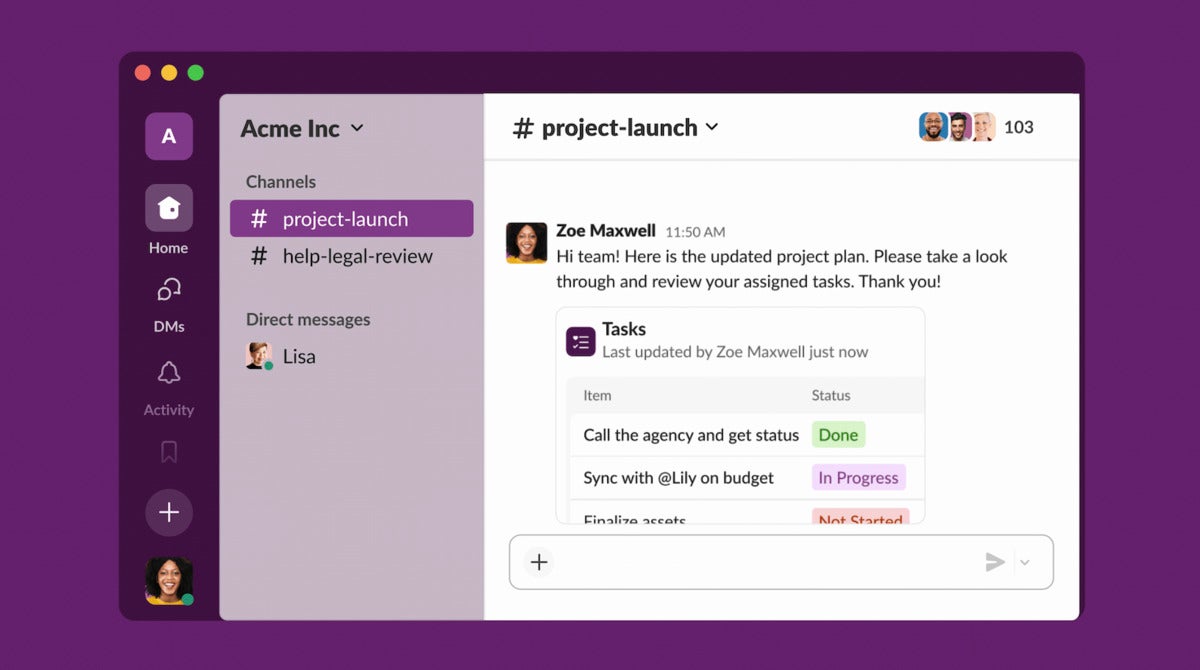Slack is building a work management tool designed to allow users to track team projects directly from the collaboration app.
The “lists” feature, announced Wednesday ahead of parent company Salesforce’s Dreamforce event next week, provides functions similar to the likes of Asana and Trello, with the ability to create, assign, and manage individual tasks as part of a larger project.
This can be done via a spreadsheet or kanban-style board layout view, with record cards containing information on related tasks, as well as information about status, due date, and which team member is responsible.
It’s also possible to attach files and documents, such as Slack’s Canvas, that relate to the project or task.
The tool will broaden the functionality Slack’s app, which is mostly focused on unstructured data, namely the conversations posted in channels and direct messages. Lists provides a way to track and manage the structured data that workers encounter as part of team projects, said Ali Rayl, senior vice president of product management at Slack, whether that’s tracking approvals and requests or managing a project launch.
“Work often needs structured data: everybody uses spreadsheets for a reason,” said Rayl. “We realized that there’s an opportunity to bring this more structured data concept into the product. What we can do is wrap our conversational interface around it, so it's great for all kinds of work that’s more structured, more discreet, and more trackable.”
Users can discuss the progress of projects in the Lists tool; the discussions appear similar to threads in the main app, where an “@mention” can draw the attention of a coworkers. Conversations are kept with the List record, but can be shared into a channel if needed.
Lists will be available in private preview this winter to select customers, a spokesperson said, ahead of a planned launch next year. Pricing information will be announced closer to general availability.
The feature is part of a larger revamp of Slack’s app, including the addition of canvas documents, a dedicated view for sales staff, an overhaul of the user interface, and the development of generative AI tools (which will also be available in a closed pilot this winter, with no scheduled release date).
Software products “need to grow with their user base,” said Wayne Kurtzman, research vice president at IDC, and “Slack's new features, paired with their ability to integrate to a wide variety of applications, are an example of meeting those needs.”
The ability to integrate with third-party applications has long been a strength of Slack’s, and while this approach isn’t likely to change, building functionality directly into its own software has benefits, too.
“Embedding native capabilities for some functionalities can help reduce or eliminate friction in employees’ day-to-day workflows; this is the case for basic project management tools for status tracking,” said Raúl Castañón, senior research analyst at 451 Research, a part of S&P Global Market Intelligence.
While there’s overlap with dedicated work management apps, Slack’s lists feature isn’t a direct competitor.
“Slack lists is a feature that targets a broader user base — namely, team members that do not require sophisticated work management and project management features,” said Castañón. “These users may have previously relied on tools not intended for that purpose — such as spreadsheets, email, messaging, and phone calls. Simple tools such as collaborative to-do lists embedded within a communication tool will likely be more effective for them.”
Microsoft also added simple task management capabilities to Teams — a major rival to Slack — in 2020 with the launch of Lists, while Google’s offering, Tables, remains in beta three years after launch.
Slack also touted updates to Workflow Builder, the firm’s no-code automation tool, with the release of a new automation hub. This makes it easier for Slack users to find and access workflow automations that are available to them (to log paid time off, or request to take a vacation, for instance), said Rayl, as well as access templates to build their own automations.
 Slack
Slack
Workflow Builder is Slack's no-code automation tool.
There are new ways for software developers to create custom apps in Slack, as well, with Slack offering to host code on its servers.
“One of the challenges that developers have always had with Slack is that if they wrote a bot [for example], they'd also have to spin up a server and manage that server in order to run their code,” said Rayl. “But now we'll run that code for you. So, you can upload your code to your own instances [and] Slack will run it for you. It's in the same secure environment — all of your data stays in the same place.”






